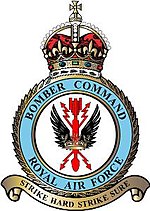
Back قيادة القاذفات التابعة لسلاح الجو الملكي Arabic Comandament de Bombarders de la RAF Catalan RAF Bomber Command Danish RAF Bomber Command German RAFeko bonbaketarien komandoa Basque RAF Bomber Command French פיקוד המפציצים של חיל האוויר המלכותי HE Bomber Command Italian 영국 왕립 공군 폭격사령부 Korean RAF Bomber Command NB
| Bomber Command | |
|---|---|
 | |
| Active | 14 July 1936–1968 |
| Country | |
| Branch | |
| Role | Strategic bombing |
| Headquarters | 1936–1940: RAF Uxbridge 1940–1968: RAF High Wycombe |
| Motto(s) | Strike Hard Strike Sure[1] |
| Engagements | Second World War |
| Battle honours | Berlin 1940–1945 Fortress Europe 1940–1944 |
| Commanders | |
| Notable commanders | Air Marshal Charles Portal Air Chief Marshal Sir Arthur Harris |
| Aircraft flown | |
| Bomber | 1939: Battle, Blenheim, Hampden, Wellesley, Wellington, Whitley.
1942: Manchester, Stirling, Halifax, Lancaster, Mosquito. 1945: Lincoln 1950: Washington B.1 1951: Canberra. 1955: Vickers Valiant 1956: Avro Vulcan 1958: Handley Page Victor. |
RAF Bomber Command controlled the Royal Air Force's bomber forces from 1936 to 1968. Along with the United States Army Air Forces, it played the central role in the strategic bombing of Germany in World War II. From 1942 onward, the British bombing campaign against Germany became less restrictive and increasingly targeted industrial sites and the civilian manpower base essential for German war production. In total 364,514 operational sorties were flown, 1,030,500 tons of bombs were dropped and 8,325 aircraft lost in action. Bomber Command crews also suffered a high casualty rate: 55,573 were killed out of a total of 125,000 aircrew, a 44.4% death rate. A further 8,403 men were wounded in action, and 9,838 became prisoners of war.
Bomber Command stood at the peak of its post-war military power in the 1960s, the V bombers holding the United Kingdom's nuclear deterrent and a supplemental force of Canberra light bombers. In 1968 it was merged with Fighter Command to form Strike Command.
In August 2006, a memorial was unveiled at Lincoln Cathedral.[2] A memorial in Green Park in London was unveiled by Queen Elizabeth II on 28 June 2012 to commemorate the high casualty rate among the aircrews.[3] In April 2018 The International Bomber Command Centre was opened in Lincoln.
- ^ Pine, L.G. (1983). A dictionary of mottoes (1 ed.). London: Routledge & Kegan Paul. p. 222. ISBN 0-7100-9339-X.
- ^ Smith, David (20 August 2006). "RAF tribute stirs up 'war crime' storm". The Observer. London. Retrieved 3 July 2008.
- ^ Rayner, Gordon (9 March 2012). "Lord Ashcroft donates final £1 million for Bomber Command Memorial". The Telegraph. Archived from the original on 10 May 2012. Retrieved 25 May 2012.
© MMXXIII Rich X Search. We shall prevail. All rights reserved. Rich X Search